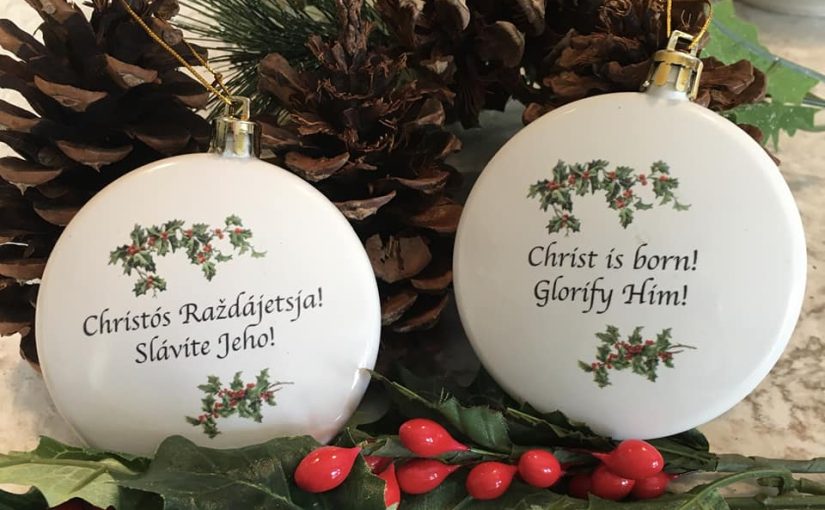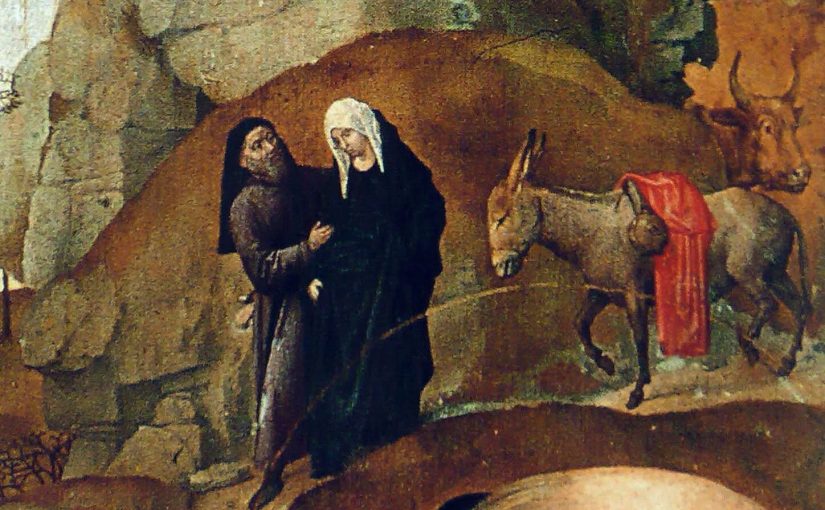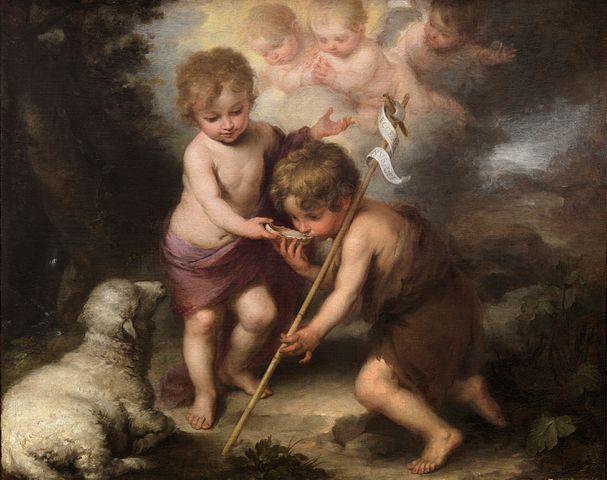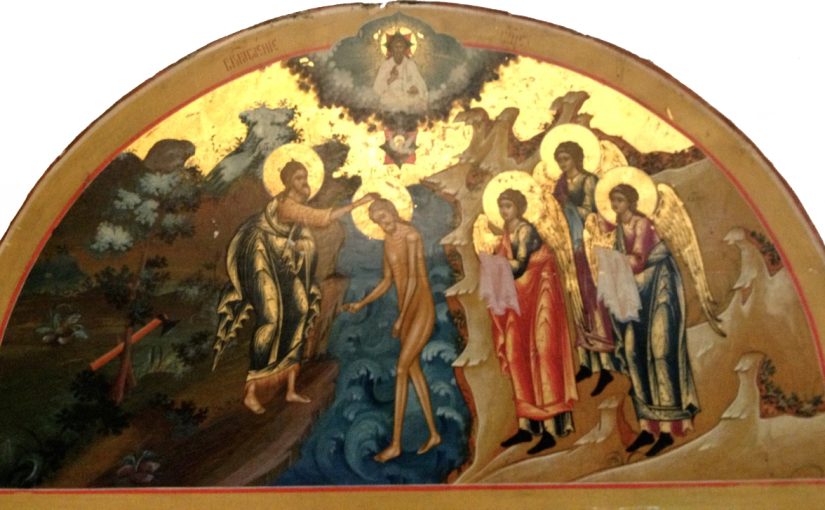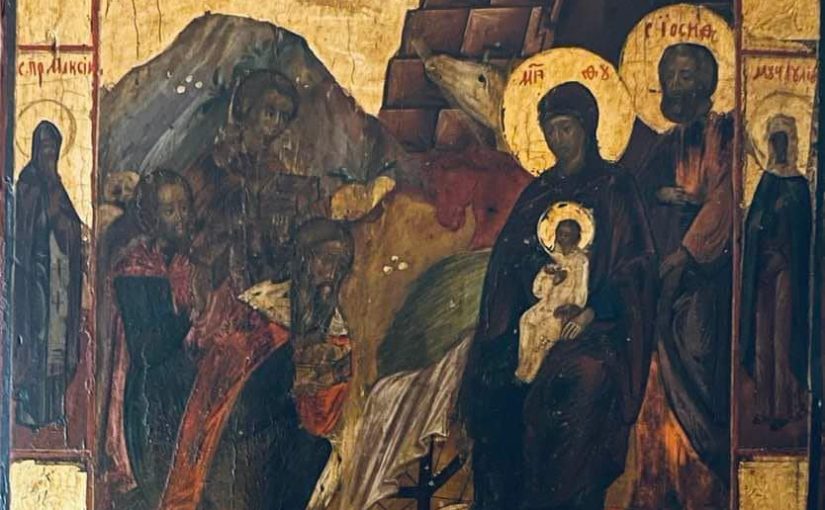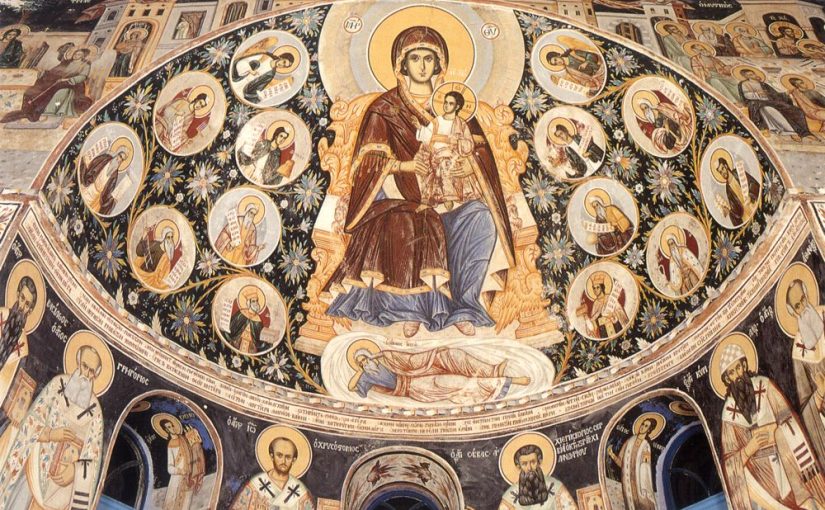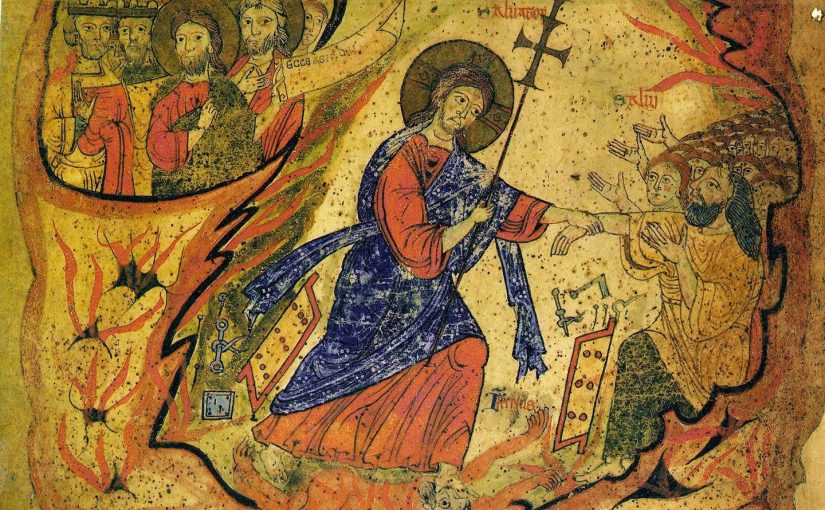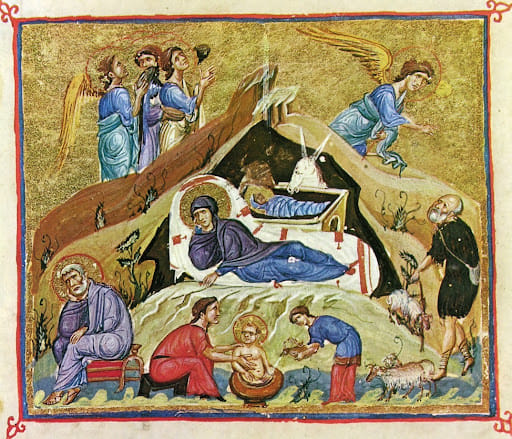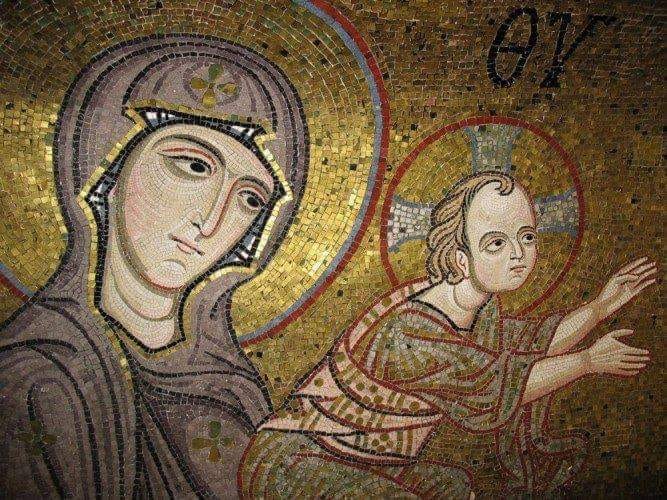“For God so loved the world that he gave his one and only Son, that whoever believes in him shall not perish but have eternal life.” Jn. 3:16
Category: Advent & Christmastide
4th Sunday of Advent 2025
Today in the Latin Church we have the 4th Sunday of Advent where it is read that the Joseph chosen as the spouse of Mary realizes his vocation to protect his bride and soon to be born child. No small feat given the context of the manifestation of the announcement of salvation and the marriage of two brought together by an angel. Imagine! The result was that Joseph “did as the angel of the Lord had commanded him and took his wife into his home.” He was noble; just, holy and a protector. Several years Pope Francis reflected on this passage by noting Joseph as protector. The Pope said,
“Joseph is a ‘protector’ because he is able to hear God’s voice and be guided by his will. The vocation of being a “protector” means protecting people, showing loving concern for each and every person, especially children, the elderly, those in need, who are often the last we think about. It means caring for one another in our families: husbands and wives first protect one another, and then, as parents, they care for their children, and children themselves, in time, protect their parents.”
One step further, how Joseph understand the events at hand? He shows compassion. We presume Jospeh as a good man, and with God’s grace Joseph changes his will to follow God’s will. He overcame his concupiscence.
As disciples of the Lord today, and as members of the Order of Malta we have a vocation to protect the Catholic Faith from disintegration and we protect the sick and poor, our lords, from discrimination. In each case we become like St Joseph.
Prepare the way of the Lord, the Baptist tells us
If you follow the Latin Church, today is the 2nd Sunday of Advent. It is the Sunday in Advent that we hear St. John the Baptist say, “Prepare the way of the Lord.” The way of the Baptist is one of the powerful keys of the spiritual life.
“In the season of Advent we too are called to listen to God’s voice, that cries out in the desert of the world through the Sacred Scriptures, especially when they are preached with the power of the Holy Spirit. Indeed, faith grows all the stronger the more it allows itself to be illumined by the divine word.” (From Pope Benedict XVI)
Baptism of the Lord
The Theophany narrative is one that includes the testimony of the Lord’s Baptism. The Baptism of Lord reminds us that the fact of the Lord’s Baptism forms in our consciousness a living icon of the Trinity, the revelation –a Theophany; the manifestation of the Tri-One God. In the Baptism, the world’s waters were sanctified and the Cosmos underwent a metamorphosis of Divine Energies.
What we commemorated on January 6, the Theophany, has direct consequences in how we live today.
Feast of the Baptism of the Lord, from a Sermon by Saint Gregory of Nazianzus, bishop (330-389 AD):
Today let us do honor to Christ’s baptism and celebrate this feast in holiness. Nothing gives such pleasure to God as the conversion and salvation of men, for whom his every word and every revelation exist. He wants you to become a living force for all mankind, lights shining in the world. You are to be radiant lights as you stand beside Christ, the great light, bathed in the glory of him who is the light of heaven.”
The Dignity of being Christian
Merry Christmas!
From a sermon of Saint Leo the Great, pope
Christian, remember your dignity
Dearly beloved, today our Saviour is born; let us rejoice. Sadness should have no place on the birthday of life. The fear of death has been swallowed up; life brings us joy with the promise of eternal happiness.
No one is shut out from this joy; all share the same reason for rejoicing. Our Lord, victor over sin and death, finding no man free from sin, came to free us all. Let the saint rejoice as he sees the palm of victory at hand. Let the sinner be glad as he receives the offer of forgiveness. Let the pagan take courage as he is summoned to life.
In the fullness of time, chosen in the unfathomable depths of God’s wisdom, the Son of God took for himself our common humanity in order to reconcile it with its creator. He came to overthrow the devil, the origin of death, in that very nature by which he had overthrown mankind.
And so at the birth of our Lord the angels sing in joy: Glory to God in the highest, and they proclaim peace to men of good will as they see the heavenly Jerusalem being built from all the nations of the world. When the angels on high are so exultant at this marvellous work of God’s goodness, what joy should it not bring to the lowly hearts of men?
Beloved, let us give thanks to God the Father, through his Son, in the Holy Spirit, because in his great love for us he took pity on us, and when we were dead in our sins he brought us to life with Christ, so that in him we might be a new creation. Let us throw off our old nature and all its ways and, as we have come to birth in Christ, let us renounce the works of the flesh.
Christian, remember your dignity, and now that you share in God’s own nature, do not return by sin to your former base condition. Bear in mind who is your head and of whose body you are a member. Do not forget that you have been rescued from the power of darkness and brought into the light of God’s kingdom.
Through the sacrament of baptism you have become a temple of the Holy Spirit. Do not drive away so great a guest by evil conduct and become again a slave to the devil, for your liberty was bought by the blood of Christ.
Salvation brought with crooked lines
In the Byzantine Church, we hear proclaimed the genealogy of Jesus, reminding us how God’s plan of salvation comes through a lot of interesting characters. Every time I hear this gospel passage I am reminded for two things: God uses the imperfect for the revelation of the perfect and therefore gives hope, and that our Savior, Jesus of Nazareth, the foretold Christ, is in the middle of our messy and complicated history offering us the gift of salvation. What is true is that God makes his home with us, and He “has a better plan for us” and we are an essential part of that plan.
“Matthew’s genealogy is extraordinarily comprehensive in his theology lf the roots of Jesus’ story in the Old Testament. But that is only one part of the story of Jesus Christ. The story has a sequence as well; and the continuing sequence is what makes the genealogy “good news” for Matthew’s audience and for us. Human being have been empowered to preserve, proclaim, and convey salvation brought by Jesus Christ throughout history. The God who wrote the beginnings with crooked lines also writes the sequence with crooked lines, and some of those lines are our own lives and witness.
A God who did not hesitate to use the scheming as well as the noble, the impure as well as the pure, men to whom the world hearkened and women upon whom the world frowned –this God continues to work through the same melange. If it was a challenge to recognize in the last part of Matthew’s genealogy that totally unknown people were part of the story of Jesus Christ, it may be a greater challenge to recognize that the unknown characters of today are an essential part of the sequence. The proclamation of that genealogy in the Advent liturgy is designed to give us hope about destiny and our importance.
By stressing the all-powerful grace of God, the genealogy presents it greatest challenge to those who will accept only an idealized Jesus Christ whose story they would write only with straight lines and whose portrait they would paint only in pastel colors. If we look at the whole story and the total picture, the Gospels teach us that Jesus’ ministry was not thus; the history of the church teaches us that the sequence as not thus. God’s grace can work even with people like us.” (Father Raymond Brown, S.S.)
Jesus is the Key to David
Jesus holds the Key to David.
(Revelation 3.7)
Only He can open and close
our access to the kingdom of God
and to Eternal Life because:
“Whoever sees me, sees the Father”! (John 14.9)
Jesus do not delay
and come save us all
prisoners
of sin and death,
from the death of sin and
of the sin of death.
“Maranatha”, come Lord Jesus!
Dear little one! how sweet thou art
This evening reflection on the Nativity of our Lord and Savior leads me to a friend’s Christmas card of this year which bears the poem of Oratorian Father and author Wilfrid Faber. Indeed, Father Faber is a terrific and powerful poet who exercised his ministerial priesthood with warmth and insight. Join me in celebrating he birth of Our Savior, Jesus Christ.
Dear little one! how sweet thou art, Thine eyes how bright they shine, So bright they almost seem to speak When Mary’s look meets Thine.
How faint and feeble is Thy cry, Like plaint of harmless dove, When Thou dost murmur in Thy sleep Of sorrow and of love!
When Mary bids Thee sleep thou sleep’st Thou wakest when she calls;
Thou art content upon her lap,
Or in the rugged stalls.
Simplest of babes! with what a grace Thou dost Thy Mother’s will! Thine infant fashions will betray The Godhead’s hidden skill.
When Joseph takes thee in his arms, And smooths thy little cheek, Thou lookest up into his face
So helpless and so meek.
Yes! Thou art what Thou seems’t to be, A thing of smiles and tears;
Yet Thou art God, and heaven and earth Adore Thee with their fears.
Yes! dearest Babe! those tiny hands That play with Mary’s hair, The weight of all the mighty world This very moment bear.
Art Thou, weak Babe, my very God? O, I must love thee then,
Love Thee, and yearn to spread Thy love Among forgetful men.
– Father Wilfrid Faber, Cong. Orat. (1814–1863)
Nativity Sermon of St John Chrysostom
Behold a new and wondrous mystery.
My ears resound to the Shepherd’s song, piping no soft melody, but chanting full forth a heavenly hymn. The Angels sing. The Archangels blend their voice in harmony. The Cherubim hymn their joyful praise. The Seraphim exalt His glory. All join to praise this holy feast, beholding the Godhead here on earth, and man in heaven. He Who is above, now for our redemption dwells here below; and he that was lowly is by divine mercy raised.
Bethlehem this day resembles heaven; hearing from the stars the singing of angelic voices; and in place of the sun, enfolds within itself on every side, the Sun of justice. And ask not how: for where God wills, the order of nature yields. For He willed; He had the power; He descended; He redeemed; all things yielded in obedience to God. This day He Who is, is Born; and He Who is, becomes what He was not. For when He was God, He became man; yet not departing from the Godhead that is His. Nor yet by any loss of divinity became He man, nor through increase became He God from man; but being the Word He became flesh, His nature, because of impassability, remaining unchanged.
And so the kings have come, and they have seen the heavenly King that has come upon the earth, not bringing with Him Angels, nor Archangels, nor Thrones, nor Dominations, nor Powers, nor Principalities, but, treading a new and solitary path, He has come forth from a spotless womb.
Since this heavenly birth cannot be described, neither does His coming amongst us in these days permit of too curious scrutiny. Though I know that a Virgin this day gave birth, and I believe that God was begotten before all time, yet the manner of this generation I have learned to venerate in silence and I accept that this is not to be probed too curiously with wordy speech.
For with God we look not for the order of nature, but rest our faith in the power of Him who works.
What shall I say to you; what shall I tell you? I behold a Mother who has brought forth; I see a Child come to this light by birth. The manner of His conception I cannot comprehend.
Nature here rested, while the Will of God labored. O ineffable grace! The Only Begotten, Who is before all ages, Who cannot be touched or be perceived, Who is simple, without body, has now put on my body, that is visible and liable to corruption. For what reason? That coming amongst us he may teach us, and teaching, lead us by the hand to the things that men cannot see. For since men believe that the eyes are more trustworthy than the ears, they doubt of that which they do not see, and so He has deigned to show Himself in bodily presence, that He may remove all doubt.
Christ, finding the holy body and soul of the Virgin, builds for Himself a living temple, and as He had willed, formed there a man from the Virgin; and, putting Him on, this day came forth; unashamed of the lowliness of our nature.
For it was to Him no lowering to put on what He Himself had made. Let that handiwork be forever glorified, which became the cloak of its own Creator. For as in the first creation of flesh, man could not be made before the clay had come into His hand, so neither could this corruptible body be glorified, until it had first become the garment of its Maker.
What shall I say! And how shall I describe this Birth to you? For this wonder fills me with astonishment. The Ancient of days has become an infant. He Who sits upon the sublime and heavenly Throne, now lies in a manger. And He Who cannot be touched, Who is simple, without complexity, and incorporeal, now lies subject to the hands of men. He Who has broken the bonds of sinners, is now bound by an infants bands. But He has decreed that ignominy shall become honor, infamy be clothed with glory, and total humiliation the measure of His Goodness.
For this He assumed my body, that I may become capable of His Word; taking my flesh, He gives me His spirit; and so He bestowing and I receiving, He prepares for me the treasure of Life. He takes my flesh, to sanctify me; He gives me His Spirit that He may save me.
Come, then, let us observe the Feast. Truly wondrous is the whole chronicle of the Nativity. For this day the ancient slavery is ended, the devil confounded, the demons take to flight, the power of death is broken, paradise is unlocked, the curse is taken away, sin is removed from us, error driven out, truth has been brought back, the speech of kindliness diffused, and spreads on every side, a heavenly way of life has been in planted on the earth, angels communicate with men without fear, and men now hold speech with angels.
Why is this? Because God is now on earth, and man in heaven; on every side all things commingle. He became Flesh. He did not become God. He was God. Wherefore He became flesh, so that He Whom heaven did not contain, a manger would this day receive. He was placed in a manger, so that He, by whom all things are nourished, may receive an infants food from His Virgin Mother. So, the Father of all ages, as an infant at the breast, nestles in the virginal arms, that the Magi may more easily see Him. Since this day the Magi too have come, and made a beginning of withstanding tyranny; and the heavens give glory, as the Lord is revealed by a star.
To Him, then, Who out of confusion has wrought a clear path, to Christ, to the Father, and to the Holy Spirit, we offer all praise, now and forever. Amen.
Presentation of the Lord
Rejoice, O full of grace, Mother of God and Virgin, for from thee has risen the sun of righteousness, Christ our God, enlightening those who dwell in darkness. Rejoice you too, righteous watchman, that you have received in your arms the Redeemer of our souls, who also gives us the Resurrection.
